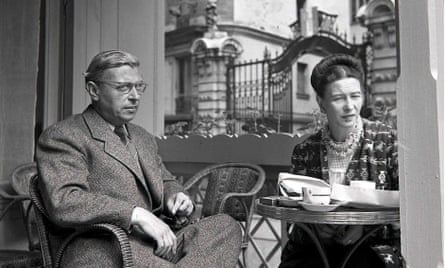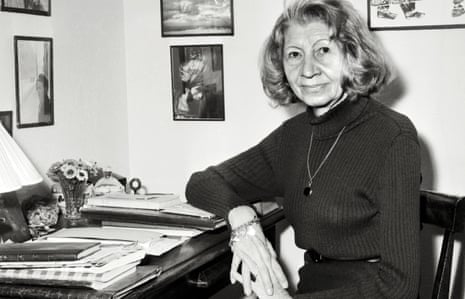The explicitly sexual tell-all memoir, with its eager flirtations with the pornographic and dislocations of heterosexuality, has blossomed in the US and France in recent years. But Violette Leduc, who did it all and said it all more than 50 years ago, is a ghostly presence in its genealogy.
It is a mysterious marginalisation: Simone de Beauvoir, who took on Leduc as a protege, remains a feminist icon. Leduc’s contemporary Jean Genet, also wrote sexually explicit, homosexual texts and is widely read and venerated as a pioneer in French avant-garde writing. Not so Leduc. Her first book, the autobiographical novel L’Asphyxie, has still not been translated into English. Her novel Thérèse and Isabelle, written in 1955, was not published uncensored in France until 2000 and was only translated and published in English by the Feminist Press last year.
A journey through Leduc’s rejections, documented in her autobiographies La Bâtarde (1964) and Mad in Pursuit (1970), lay bare the insidious gatekeeping that money and masculinity exert on literary inclusion, then and now. Leduc was born poor and illegitimate; her mother is the help, her father is the heir and she, the child of their furtive union, is unwanted. Her single mother has to scrounge and serve, always skirting the boundaries of respectability until she finally finds a “respectable” husband. For much of her childhood, Leduc’s feminist education comes not from books and café chats but from her mother’s exhortations, delivered at the breakfast table. She learns about men from her mother: “There wasn’t a single among them to redeem the race as a whole. To take advantage of you, that was their aim. I must get that into my head and never forget it. Swine. All swine.”
Predictably, Leduc’s early childhood is peopled entirely by women. Her mother’s angst at her sickliness and illegitimacy is tempered by the unconditional love of her grandmother, Fideline. Her death, when Leduc is nine or ten, marks the end of her childhood.
When her mother finally marries, Leduc, installed at a boarding school, feels bereft and betrayed, now an outsider in the home her mother is making with another man. The love she believes she cannot find at home she looks for in other girls – and women, having an affair with her music instructor who was later fired. Her first sexual encounter, erotically rendered in both Thérèse and Isabelle (where it is fictionalised) and La Bâtarde (where it is not), reveals a writer exceptionally gifted in rendering the depth and passion of sex. Lust, its fever, its delicacy and its delusions, are here - and throughout Leduc’s work – is overwhelming, the basis for all human connection, its construction and destruction.
It is no surprise that when she finally meets Simone de Beauvoir in 1945 (after months of stalking her at Paris’s Cafe Flore), her obsession is as much sexual as intellectual. De Beauvoir, the privileged product of elite schools, takes Leduc under her wing and encourages her to write. Leduc’s first novel, L’Asphyxie, is published by France’s premier publishing house, Gallimard, thanks to De Beauvoir’s efforts. After De Beauvoir rejects her sexually, Le Duc writes of her devastation: “She has explained that the feeling I have for her is a mirage. I don’t agree.” The word wounds her in its implication that her starved longing for love is somehow less than real – or in De Beauvoir’s terms, less authentic. “My life lies elsewhere,” Beauvoir writes in a letter to Leduc, and Leduc correctly guesses that her lover, the philosopher Jean-Paul Sartre “is inside that word ‘elsewhere’”.

The juxtaposition of De Beauvoir and Leduc is revelatory in terms of who defines feminism and who actually lives it. Here is Leduc, a woman made feminist by experience: a fatherless, poverty-stricken childhood, a youth spent grovelling for affection and sustenance, her wartime hustle smuggling legs of lamb to rich Parisians. Her autobiography painfully and pointedly underscores her constant alienation, her surfeit of emotion. Ever the outsider, she steals, she smuggles; when she reads and learns, it is in bits and pieces. Days spent writing are imbued with worries about eating, surviving. Uninterested in branding and constructing her own myth, she bluntly tells De Beauvoir that she is not an intellectual. This annoys her mentor, to whom Leduc recalls retorting: “You are an intellectual because you write.”
De Beauvoir spent her time earning the title “intellectual”. Her story is one of early erudition, acing exams, stunning philosophical acuity and a romantic (if also conveniently strategic) alliance with Sartre. In Leduc, she sees the authenticity that she theorises, and in playing midwife to her self-exposition she seeks the vindication of her philosophy. In existentialism, we are all free to choose, exercise our radical free will; the constraints of past experience can be shaken off, truth told and freedom achieved. Leduc’s life, told in her writing, has to be evidence of the truth of this. De Beauvoir’s feminism, unleavened by any literal struggles with the whims of men, needs Leduc’s literary liberation to prove its practical application.
Yet it is only De Beauvoir’s prescient and crisply analysed feminism that we remember and celebrate. The lived feminism of Leduc – raw, passionate, and devastatingly honest – is what we choose to forget. There are contemporary iterations to this divide: like Leduc, the women fighting the battles on the factory floors of China, or in the classrooms of Egypt or the streets of Karachi do not have the luxury of writing their lives and finding liberation. The lived feminisms of the women who clean French hotel rooms, who eke out lives in banlieues, who are expelled from schools for wearing headscarves, are absent from the country’s feminist and literary narrative.
It is still De Beauvoir’s compelling feminist recipe that one wants to believe. It is, however, Leduc’s truth that presses closer: speaking of De Beauvoir’s prescription, she says: “To write is to be liberate oneself. Untrue. To write is to change nothing.”
Leduc would have been 109 on Thursday; she passed away in 1972. In the France she lived in, a provincial woman, a smuggler, a lesbian who lived wildly and loved madly, was not deemed worthy of inclusion into cultural narrative, into canon and classroom. She may be dead, gone and forgotten, but she may still be right.

Comments (…)
Sign in or create your Guardian account to join the discussion